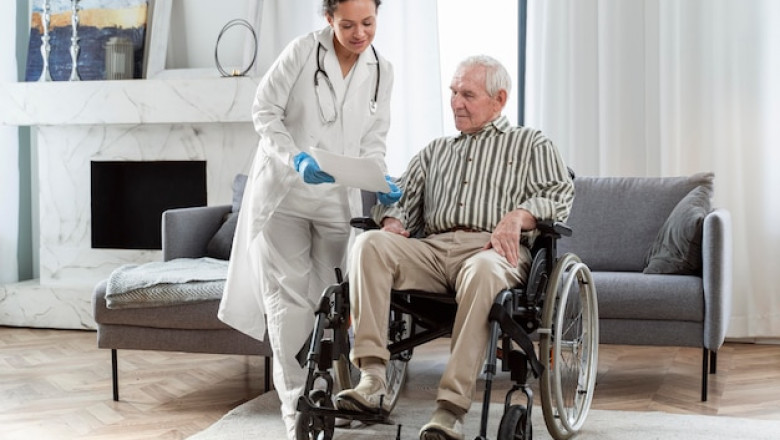views
When it comes to home healthcare, there are several services available to meet the diverse needs of patients. Among these, bedside assistance and home health aides stand out as two critical services that offer invaluable support to individuals requiring care at home. While these terms are often used interchangeably, they serve different purposes and cater to varying needs. Understanding the distinctions between bedside assistance and home health aides can help families make informed decisions about the type of care that best suits their loved ones, particularly when it comes to rehabilitation.
What is Bedside Assistance?
Bedside assistance also known as bedside aide for rehab primarily involves non-medical support provided to individuals who need help with daily activities. This type of care is usually offered to those recovering from surgery, illness, or injury, and is focused on ensuring the comfort and well-being of the patient. Bedside aides are trained to assist with tasks such as:
· Personal hygiene (bathing, grooming, dressing)
· Mobility support (helping patients move around the house or transfer from bed to chair)
· Meal preparation and feeding with feeding tubes, ileostomy, infusion medication, hospice care
· Light housekeeping
· Companionship and emotional support
Bedside aides are particularly beneficial for individuals who need temporary help during their recovery period. They are trained to offer compassionate care, ensuring that patients feel comfortable and supported as they regain their strength and independence.

What is a Home Health Aide?
A home health aide, on the other hand, provides a higher level of care that includes both non-medical and basic medical support. Home health aides are trained professionals who work under the supervision of a registered nurse or therapist to deliver comprehensive care to patients with chronic conditions, disabilities, or those recovering from severe illnesses like Alzheimer's, dementia, Parkinson's, etc. Their responsibilities include:
· Administering medications and monitoring vital signs
· Assisting with medical equipment and mobility devices
· Providing wound care and managing dressings
· Conducting physical therapy exercises
· Offering personal care similar to bedside aides
Home health aides are equipped to handle more complex health needs, making them an ideal choice for individuals requiring ongoing medical care and rehabilitation.
Bedside Assistance for Rehabilitation
Rehabilitation is a critical phase in the recovery process, especially after surgeries, injuries, or severe illnesses. bedside aide for rehab can significantly contribute to a patient's rehabilitation by providing the following services:
Personal Care: Ensuring the patient maintains good hygiene and feels comfortable, which can positively impact their recovery process.
Mobility Support: Helping patients with exercises prescribed by physical therapists, assisting with mobility, and preventing falls.
Nutritional Support: Preparing balanced meals that cater to the dietary needs of the patient, promoting faster healing and overall health.
Emotional Support: Offering companionship and emotional support, which can be crucial for mental well-being during recovery.
While bedside aides are not medical professionals, their presence and assistance can greatly enhance the rehabilitation experience, providing patients with the confidence and support they need to recover effectively.
Home Health Aides for Rehabilitation
Home health aides are particularly beneficial for patients undergoing rehabilitation, as they can offer more specialized care, including:
Medical Supervision: Monitoring the patient's condition, managing medications, and alerting healthcare professionals if there are any concerns.
Therapeutic Exercises: Assisting patients with prescribed physical therapy exercises, ensuring they are performed correctly and safely.
Advanced Care: Managing wounds, handling medical equipment, and providing specialized care tailored to the patient's specific medical needs.
Coordination with Healthcare Providers: Communicating with doctors, nurses, and therapists to ensure the patient receives comprehensive and coordinated care.
The medical expertise of home health aides makes them indispensable for patients who need intensive rehabilitation and medical supervision. Their ability to provide both personal and medical care ensures that patients receive holistic support throughout their recovery journey.
Choosing the Right Care for Rehabilitation
Deciding between a bedside aide for rehab and a home health aide depends on the specific needs of the patient. Here are some tips to consider:
Medical Needs: If the patient requires medical care, medication management, or has complex health needs, a home health aide is the better choice.
Duration of Care: For short-term recovery with minimal medical intervention, bedside assistance may be sufficient. However, for long-term care and ongoing rehabilitation, a home health aide would be more appropriate.
Level of Independence: Patients who are relatively independent but need help with daily activities may benefit more from bedside assistance, while those with limited mobility and health issues will require the expertise of a home health aide.
Budget: Consider the cost of each type of care. Home health aides typically charge more due to their advanced training and medical responsibilities. Evaluate your budget and explore insurance options that may cover home healthcare services.
Combining Both Services
In some cases, a combination of both bedside assistance and home health aide services may be the best approach. This hybrid model allows for flexible and comprehensive care, ensuring all aspects of the patient's needs are addressed. For example, a patient recovering from major surgery may initially require the intensive medical support of a home health aide and then transition to the less intensive, but still supportive, care of a bedside aide as they regain strength and independence.
Conclusion
Understanding the differences between bedside aide for rehab and home health aides is crucial for making informed decisions about the care needed for rehabilitation. Bedside aides provide essential non-medical support that enhances comfort and daily living, while home health aides offer a higher level of medical and personal care necessary for complex health needs. By assessing the patient's medical requirements, duration of care, level of independence, and budget, families can choose the appropriate type of care to ensure a smooth and effective rehabilitation process. In many cases, combining both services may provide the most comprehensive and supportive care, facilitating a faster and more comfortable recovery journey.
For more information, call us at: 1-844-331-0006






















Comments
0 comment